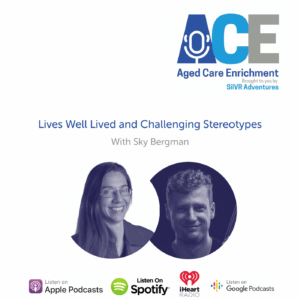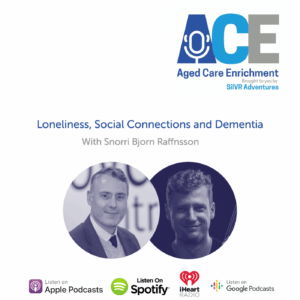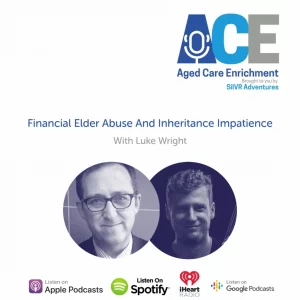Angela Rippon has long been a trial-blazing pioneer of British television. As the first female newsreader for the BBC, the first host of Top Gear and an enduring fan favourite, she has worked in TV for over 50 years.
When her mother Edna passed away with vascular dementia in the early 2000s, Angela became an outspoken ambassador for Alzheimer’s and dementia awareness. This work led her to be asked by former British Prime Minister David Cameron to establish dementia friendly communities across the UK, and saw her be part of a movement to normalise the conditions.
She shares with listeners her journey in advocacy and how things have improved so much for people living with dementia in the past two decades. She also shares some advice for people who might be caring for a loved one with dementia, and encourages us all to not give up hope as we age.
Ever a breaker of stereotypes, Angela continues to redefine what’s normal for people at all stages of life – and she challenges us all to view our later years with optimism.
Transcript
Ash de Neef: Great, Angela. Thank you so much for joining us on the program today.
Angela Rippon: It’s my great pleasure. I have many friends in Australia, so hopefully I should be talking to some of them today, as well as to the rest of your listeners.
Ash de Neef: Yeah I hope they’re listening and I’m sure a lot of our British listeners will be familiar with you. But for the Australians and perhaps Kiwis who aren’t familiar with you and your work, can you give us a quick overview of your career?
Angela Rippon: Quick overview. I started work as a journalist. I wanted to be a photo journalist, so I did my apprenticeship in journalism and photography for five years. Worked on my local newspaper, got picked up by the local television station because I had lots of bylines on the things that I was doing. So I started working for the local BBC television 54 years ago.
I worked for the BBC in the West country for several years, then I moved to ITV in the West country. Some of your listeners may know Westwood television, which was very famous in the West country where I work, where I was a producer, a director, as well as a presenter. And I got the bug to go to London and I applied for a job in London. And I ended up working for BBC television news as a reporter. And then as the first journalist woman newsreader in Britain, it was quite a phenomenon to have a woman reading the news on national television in Britain.
But since then I’ve worked on scores of different programs Strictly Come Dancing, I was the first presenter of Top Gear, I’ve done all sorts of documentaries and programs and I’ve been around a long time – let’s put it that way.
And I currently work on a program called Rip Off Britain, which is a consumer program on television, which I do with Gloria Hunniford and Julie Somerville. Some of your listeners may know of both of them because they like me have been around a long time. I make documentaries and I work for about four other programs on the BBC as well.
And I suppose some people will remember, I was one of the founders of TV AM the first commercial breakfast station in Britain. So it’s been a long and varied career, but I’m still, yeah.
Ash de Neef: And still very busy by the sounds of it as well. Angela.
Angela Rippon: I am, I’m very fortunate. And in fact, I think it’s one of the things that’s kept me sane during our lockdown here, because like you we’ve been suffering from the COVID-19 pandemic. And there have been quite, not quite as draconian I think as the rules that you’ve had, which is an Island has kept New Zealand and Australia very secure.
But as an Island, just off the coast of Europe we’ve done our best to stay secure. We’ve had lots of lockdowns, but I’ve been fortunate because, my friends all laugh when I say this, but people working on television are considered to be essential workers. They all look at me and say “you? Essential? Get off!” anyway.
So I’ve carried on filming and recording and being in the studio and that’s really kept me going. And that’s what I’m still doing now. I’m working on currently four different programs with a couple of other things upcoming for the rest of the summer.
So it’s been very busy for me, but like everyone else obviously I’ve missed not being able to have close contact with friends and relatives, but we’re gradually getting round to that as well.
Ash de Neef: Yeah, fantastic. And something that you’ve been involved in since the early two thousands is Alzheimer’s advocacy.
How did you get involved in Alzheimer’s?
Angela Rippon: My late mother Edna and developed frontal lobe vascular dementia within about six months of my father suddenly dying of a massive heart attack. And I think the research that’s been done into dementia in general, and those people involved with in dementia will know there are more than a hundred different variants that you can get of dementia, Alzheimer’s probably being the best known.
And what some of the research that we’ve done demonstrates that the process of dementia can begin in someone’s brain, something like 20 years before it actually manifests itself. And then it can suddenly be brought on by something like a sudden shock, which I think is what happened in my mother’s case.
She, within six months of my father dying suddenly she became quite distracted. She became very agoraphobic. She became very suspicious of people and suddenly all of these things started to build up. And in my father died in 2003, and in 2004 we got a diagnosis of vascular dementia in my mum.
And albeit that I’m a journalist and I’ve worked in my career in television, on medical programs. I knew very little about dementia, which says more about dementia, I think, than it does about me because. We’re talking about 2004. And as with so many countries, certainly back in 2004 dementia was very much a subject that people did not discuss openly. The word stigma was very strongly attached to it.
There was a stigma. We know that. People would perhaps not admit, they’d say, “Oh, granny’s gone a bit doolally”, without wanting to admit that actually what granny had or your dad or your partner, or whoever was actually a severe physical illness of the brain. And our knowledge of dementia was relatively narrow as well, and I knew very little about dementia.
So I contacted the Alzheimer’s society who were an enormous help by giving me lots of information about what was happening to my mum. What was likely to happen in the future, how she was likely to respond and how importantly, how I should respond. And so I became an ambassador for the Alzheimer’s society. And from the very beginning, I realized that there was a huge job ahead of us. We’re talking what almost 20 years ago aren’t we, if we’re talking about 2004.
And I remember doing an interview with a national newspaper, about my mom’s condition, because I felt it was important as a journalist and someone who had a public profile that I would get out there like a lot of the other ambassadors and talk about it and take away the fear and the misunderstanding and the stigma that was associated with dementia.
And I remember during the interview lady journalist, she said at one point to me, “aren’t you embarrassed talking about this?”
Ash de Neef: Wow.
Angela Rippon: And yeah, you see your reaction now is what I would expect, but then it seemed to her to be a perfectly normal thing to ask because people did not talk about dementia or Alzheimer’s in public.
They did keep it tucked away within families, they kept it in the shadows if you like. And I was very determined that it should be brought out of the shadows and into the public spotlight so that people stop being embarrassed about it. And I remember saying to her, “people aren’t embarrassed anymore to talk about Parkinson’s or if their family has had a stroke or even, the big C,” which everyone used to refer to cancer.
People talk openly about it now, and that’s really important. And I think that was what spurred me on to do as much as i’ve done over the last, what 18, 19 years. To try and do precisely that, take away any embarrassment associated with it.
And try and add to them to the national sum total of knowledge about dementia and my goodness in those 18 years, we’ve made enormous strides, not down to me personally, but to lots of people who have taken that same lead and taken that same opinion.
And as a result we’ve had not just lots of information about it in newspapers and stories about people with dementia in newspapers. But we’ve had it included as a running story in many of the soap operas, some of your listeners may be aware of the long running soap opera on Radio 4 The Archers. They had a five-year running story about dementia, how it affected an individual and the families around them.
EastEnders had a great soap opera here in Britain on television, had a storyline on dementia. So I think did Hollyoaks one of the others. Then we had two Oscars given to performances from people who have had dementia, the most recent being just a couple of weeks. Just couple of days ago now for The Father, for Anthony Hopkins.
Because dementia now is seen as something that people should know about, and can know about and those wonderful storylines, take it to a whole new audience for people being able to understand what it’s about.
So in 2004, when I got involved with it, my goodness, I’ve seen so many changes. Thank goodness, but we’re still only halfway there. So there’s still a lot of work to be done.
Ash de Neef: Yeah. That is a fantastic amount of progress there. Did you find that after the first couple of interviews, when you’re having these sort of questions about, “shouldn’t you be embarrassed?” Did you have people reaching out to you, people contacting you saying, “thank you for speaking up about it,” or did anybody kind of contact you on the back of those?
Angela Rippon: Oh, totally, yes. Through the Alzheimer’s society, through my work on television. Yes. And in fact, in the subsequent years, I’ve spoken at many national and international conferences pitching it to a particular audience. I convinced the national association of local governments here in Britain. To give us their support so that local governments would start to follow up on a scheme that they Alzheimer’s society began. Which they pinched from Japan incidentally, called dementia friends, which is getting people to understand. And I think you’ll have it in Australia as well now and New Zealand.
Getting people to understand dementia and how they might help. Whether they’re people that work in shops and offices, banks, supermarkets on the telephone, whatever. To understand that they might be dealing with someone with dementia and how they can help them.
But also for friends and family to understand more about it. And that has subsequently grown into a situation where I was asked in 2012, along with Jeremy Hughes, who was the chief executive officer of the Alzheimer’s society by the then prime minister, David Cameron, if we would establish a committee called the Prime Minister’s Champions to create dementia friendly communities in Britain.
Which is in other words, going into local government, going into large businesses and corporations into schools and getting people to accept as a community that they could learn more about dementia and support their own dementia community.
And I remember the first meeting that we had with David Cameron, this was in 2012 and he was going to be in office for the next three years from then I think. He said, “by the end of my term of office, I would like to think we have 20 dementia communities around the country.”
And I remember saying to him, “if we’re going to do our job Prime Minister, you can add a naught to that. I’m hoping we’re going to have at least 200.” And in fact, we exceeded that and have done. And we now have hundreds of dementia friendly communities. Because I took a community to mean not just a city and cities like Birmingham and Manchester and Blackpool and Plymouth.
In fact, my hometown, I’m proud to say was the first dementia friendly city in the country and others followed. But there are also dementia friendly communities that we’ve established if you like corporate divisions.
In other words, we got the banking sector to say, we’re going to train all of our staff in how to deal with people with dementia. So that if somebody came in say three days in a row withdrawing lots and lots of money, and the staff would recognize perhaps there was something there that wasn’t quite right. And they could say, “are you absolutely sure about this?” That’s to do with recognizing and acknowledging lasting power of attorney with people.
We then got supermarkets. So that perhaps people, sitting at the checkouts would recognize if somebody was buying suddenly I don’t know, say 12 bottles of washing up liquid or whatever. They would be able to say gently, “are you sure you need 12? Why not just take one?”
We got British telecom involved so that when people were discussing anything technical on the telephone, they could recognize whether or not someone perhaps had dementia and how they might deal with them.
We’ve done it with transport services, taxi services across the company. In Blackpool for instance, they have a wonderful system in Blackpool where the drivers recognize people with dementia. So we went to lots of different organizations and produced something like 16 books on code of conduct for each of those areas within the country.
I suddenly realized one day it was all very well having dementia friendly communities, where we talked to adults, but we needed a dementia friendly generation of young people who would through school learn, what is dementia? They might recognize it in their grandparents and their parents, friends, their godparents, their aunties, their uncles. They would recognize what it is and know how to deal with it.
They would learn about dementia. They would take that knowledge back to their families. They would grow up with that knowledge and take it into their maturity, not be afraid of dementia and whatever line of work they went into, whether it was nursing or banking, or working in a local shop or an insurance or whatever. They would recognize dementia and know how to deal with it. So we would have this network, if you like of humanity, of individuals, of communities, understanding people with dementia and how to support them and their families.
And we have, for instance, with children we’ve done, we’ve now got over a thousand schools in Britain that are involved in this and have dementia awareness programs as part of their curriculum. And we started with primary schools. Older children, you expect, they’re going to understand, but in Kent and County of Kent, the schools there did a wonderful thing where they got the children in schools to write diaries. If they had someone with dementia in their family.
And we had some wonderful things that came out like one little lad saying, “I love going out with my granddad because he always does daft things, so we laugh all the time.” And another one saying, “my granddad gets up at three o’clock in the morning sometimes and he’ll put on a sweater and then he’ll put on another sweater. Then he’ll put on another sweater and another sweater, and then he’ll wake up my mum and she shouts at him, but I just think he looks like the Michelin man. And I think he’s funny.” So you have children with this wonderful naivety that accepts people with dementia.
And we then started a program where we got local schools going into care homes locally and joining in craft projects with people in care homes. People who have dementia, but people who didn’t, people who were in a care home because they were elderly on or felt that was where they needed to be safe.
Now, over the years, we’ve built up this amazing network in commerce, in industry, in schools, of people who are aware of dementia and who are therefore able to help the police service. For instance, fire brigades, everybody you can think of. That’s going to have any kind of contact with someone who might have dementia.
So that we don’t have for instance the appalling situation I was reading about last week that happened in America. Where two American police officers arrested a woman of 73 who has dementia. She had left a supermarket with $13 worth of food that she hadn’t paid for. Something that someone with dementia is actually likely to do.
In Britain, if that had happened, I would hope now because of the training that we’ve done with police forces, throughout the country that a police officer would treat that person with dignity and realize what they need is help. As I say I’m just delighted the way that so many people in Britain have acknowledged what dementia is and how to deal with it.
And you say, did people get in touch with me? Yes. Not only to speak at conferences, but friends, family, friends would ring me up and say, “Ange what are going to do?” My dad has got dementia. And he started screaming at me and these really difficult. And he won’t go out.”
And I’m able then to share with them my personal experiences. And say when my mum did that, I learned the hard way that it’s not my mum screaming at me and being, she was at times quite vicious in what she was saying. This is the dementia talking. You have to let it wash over you. And at an appropriate time, change the subject. Take their mind elsewhere and it’ll work. And just be aware that all of these things are going to happen.
And my mum used to say things like, “I’m going to have tea with your granny this afternoon.”Now my granny died when I was four years old. So had been dead very long time. And there was no point in me saying to my mum, “Oh mummy don’t be silly you know granny is dead”, because that would upset her. She would withdraw within herself and become really distressed perhaps because in her mind she thought my granny was still alive.
It’s much easier to inherit that parallel universe and say, “Oh really? You’re going down the village then? You’re going to have a cream tea with granny this afternoon?” And change the subject. And things that I learned dealing with my mum and things that the Alzheimer’s society are aware of and they pass on.
I’m always, I feel very privileged when people complete strangers sometimes come up to me and say, “can I talk to you about my aunt?” Or, “can I talk to about my father?”Because they’ve got dementia and we’re not quite sure how to deal with them. “And I am always more than happy to stop and talk to people and assure them that don’t get distressed yourself.
And there are things you can deal with. And this is how you might do it. And I think, that’s the point of being an Alzheimer’s society ambassador is sharing knowledge and sharing, if you like, comfort with people. To say it doesn’t have to be terrible, it doesn’t have to be the end of their lives or the end of your life.
There are ways that you can deal with this. And certainly there are ways that you, as an individual can not feel unhappy or distressed when your partner or your loved one is unpleasant towards you. Because it’s just the dementia speaking.
And all sorts of other ways in which, I can help them with accessing social services, getting over the feeling of total, sometimes betrayal, but always guilt. If it comes to the point where you feel, you have to put your loved one into a care home, as I did with my mum. I looked after her at home and I had a living carer at home because I was away filming obviously. So I wanted to keep her in her own environment for as long as possible.
But eventually my mother’s social nurse said to me, “look, she needs 24/7 care.” And even though I had somebody living in, when I wasn’t there, my mum would sit on the end of the carer’s bed at three o’clock in the morning, having lost all concept of time, waking this poor woman up and saying, “why aren’t you doing my breakfast? I need to have a shower. Come and help me get dressed.”
So the poor woman was never getting a full night’s sleep. And my mum’s dementia was becoming more and more difficult to manage. And I had to make that terrible decision, which said, “mommy, I can no longer look after you. You need 24/7 specialist care.”
And she went into a care home locally in Devon, which was lovely and where the staff really did look after her. But i’ve been to so many care homes and I’ve spoken to many members of families who say, “I just feel guilty. I can’t care for my mum anymore.” Or my father, my partner, “I have to put my trust now in the care home to ensure that they will look after my loved one in the way that I would, but I still feel guilty for doing it.”
So I do always feel privileged when people talk to me and asked me to help them more, or ask me to go and talk to their conference or whatever. Because that is the only way when people are open and honest and talk about these things in public. That more and more people will recognize what having dementia means and that it doesn’t have to mean the end of life, that you can live well with it for very long time.
And if I’m able to do that then I feel I’ve justified the various awards or whatever that I’ve received for the work that I’ve done.
Ash de Neef: Fantastic. I know you produced a piece of television for the BBC, “The Truth about Dementia,” right? And there’s a segment in that, that unfortunately I’m region locked over here in Australia that I couldn’t get the video for it in the iplayer. But there’s a section there where you were looking to see if you had any susceptibility and what was that experience like for you?
Angela Rippon: First of all, I was quite confident in doing all of the tests that were involved because Alzheimer’s or dementia is not it’s not genetic. There is a form of dementia, which is genetic and that’s early onset, but that you get that in your thirties or your forties.
And I spoke to some very brave people who – one gentlemen, who knows that his brother and his father and his grandfather all died with dementia, very young. And he was in his thirties. He had to leave the army because he was diagnosed with dementia in his thirties. And he was very brave talking about it, recognizing through what had happened to his brother, what was going to happen to him.
And I spoke to other people who have dementia in their family, and they have the early dementia gene who are taking part in an amazing set of research that’s being done at Queens university in London. Not knowing whether or not they’ve got the gene, not wanting to know whether or not it’s going to happen to them, but being prepared to do tests regularly, just so that the researchers can follow the progress of early onset dementia.
So as I think I was in my sixties or early seventies, when I made that film, I knew I didn’t have early onset dementia. So that was fine. And I went through lots and lots of tests. And I think what came out of that was an appreciation of, and a vindication of the research that’s been done. Which demonstrates that, although, yes, the signs of dementia can start in the brain 20 years before it actually manifests itself. That basically in the same way that you need to keep your body fit.
If you want to avoid your muscles atrophying and not being able to do things, in your seventies and your eighties in the way that you would like to. Similarly the cells in the brain can, not exactly atrophy, but they can be covered in a thing called beta amyloid, which is a plaque. Which the best way to describe it is that it just like things that fur up your arteries or fur up your plumbing, beta amyloid as a plaque, which can attach itself to individual cells and actually strangle them and kill them.
And that’s what happens when you get dementia or Alzheimer’s and if you keep your brain active, then it will certainly delay or prevent altogether the fact that you’re going to get dementia. Not in everybody, because people who never smoke get lung cancer, people who have led very healthy lives could suddenly drop dead of a heart attack because. There are certain things in medicine over which we have absolutely no control whatsoever, and dementia along with a lot of other illnesses is one of them.
But we can do things to keep our brains healthy in the way that we can keep our bodies healthy. And one of them is one of the things we discovered was that if you are constantly challenging your brain, particularly if you challenge it to do something new that you’ve never done before, then you’re likely to the chances of you getting dementia are certainly diminished and reduced.
And one of the things that we certainly discovered was that learning a language is the most effective thing you can do to prevent dementia. And this was based on research that was done in India, where they find that dementia is not particularly prevalent among people in India, because so many of them have to learn at least three languages.
They have their local dialect, they have to learn English and they have to learn whatever the national language is in their part of India. So they’re constantly going from one language to another and the brain cells are permanently working. So we discovered that and they sent me off to learn Chinese, which I was not terribly good at, but I still remember some of it.
But the job that I do means that, I constantly have to use my brain to learn things, to remember things, to write things, to research. When I’m doing live television on air, to keep my brain working so that what I do means that my brain is in gear with my mouth and what comes out the other end is understandable and comprehensible.
And you very rarely get people in broadcasting or acting for instance, who get dementia very rarely. And that’s because they’re constantly having to learn and retain that information. So it was an interesting exercise. I don’t think I was, and I don’t mean to sound grand about this, but I didn’t think I was too worried that I was going to come out with dementia.
I’m now 76 and I do forget things, and I work on the principle that having lived for 76 years, my brain is full of rather a lot of things. And so perhaps, yes, things will drop out eventually. But, people will say, they’ll forget something, “Oh God, I’m getting dementia.” No, you’re not. Dementia is something quite different. Just forgetting things I think is something that you’re allowed to do the older that you get, because you’ve got so much in your brain that you’ve got to try and retain.
Ash de Neef: Absolutely. Yeah. And what you’re saying there really ties into something else you’ve spoken about. As we’re getting older, not ceasing the activities that we’re doing really engaging in with life all the way through.
And I know that you have a bit of a history of breaking stereotypes. There’s a fantastic clip from the first episode of Top Gear where you’re talking about being a woman and being someone who likes driving cars, what a radical idea that might be.
But what are some stereotypes about older adults or about people living with dementia that you’d like to see eliminated?
Angela Rippon: I think older people in general. Age is only something that appears on your birth certificate. It has nothing to do with the way that you think or the way that you lead your life or the attitudes that you have, or it shouldn’t, as you get older, that’s not an excuse for atrophying.
It might be a perfectly good excuse for saying, “I’m going to slow down a bit because I can’t now do in my seventies, what I did in my thirties.” But my goodness, you can still achieve a huge amount. You can go on living every day to its fullest. You don’t have to sit at home, just watching television all the time – unless you want to be a television critic in your seventies.
Life is full of so many wonderful opportunities, potentials and possibilities. Life isn’t like a video recorder or things that you watch on television. We don’t have a replay button. We can’t go back and do bits again. We can’t, we might want to, but no-ones been able to medically make that possible yet. So you have to do everything as if it’s the first time and the last time and make the most of it.
And I think perhaps previous generations might have thought that way. I suspect that the generation that I belong to and the ones coming after me don’t think that way. I’m sure you don’t think that way. And you’re much younger than I am.
Life is full of so many potentials that why would you then want to let them pass unless you are happy doing that? I have many friends for whom retirement means they’re able to work on their garden. They can play more golf, they can play more tennis. They can sit at home and read. They can spend time with their grandchildren.
In other words, their lives are full of things that they want to do. And I think retirement and age in itself means that you’ve probably stopped doing the job that you’ve been doing for a lifetime or you may have done several jobs in a lifetime and you’re now given the opportunity to do what you want. And I think that it’s a terrific time of your life if you’ve still got all your marbles to be able to demonstrate that actually you are still of course, a very valuable member of society in all sorts of ways.
A company here in Britain, I don’t know if you have them in Australia, called BNQ some years ago were one of the first to make it a company principle that they employed people who were retired, that wanted to go back to work. Because they needed their age and experience and they needed them to be there to help younger people, perhaps who didn’t have anyone as a mentor in their own family. And my goodness it made such a difference to the consumer’s appreciation and experience when they went into those stores, because there were people who knew what they were talking about and were able to work with younger people.
So I don’t think anyone let alone, elderly people themselves should write off a generation just because you’ve reached a particular age that corresponds with what it says on your birth certificate. We shouldn’t do that because everybody can still, goodness, me. I don’t know about Australia, but certainly here in Britain, I think that the charitable organizations would grind to a halt, if they didn’t have retired people who are running the charity shops. And being the ones who are out collecting and doing all of those things people who have a nine to five job or a working haven’t got the time or the opportunity to do.
Let’s get rid of this idea that once you hit a particular age, that means that you’re no longer useful to society because there are so – when I was making a film on how to stay young we went to Japan. And one of the people that we interviewed was a 92 year old surgeon who was still, who had still up until about six months before we interviewed him still been working in surgery. He was so sharp and so bright and his hands were still solid, but he couldn’t do surgery anymore because his legs were giving out. He couldn’t stand up for eight hours doing major hip surgery or whatever.
Don’t ever write people off. That’s the first, and as an individual, don’t allow yourself to be written off. You’ve still got so much to offer, all the years of experience that you’ve had, but it’s a time when you should be able to do what you want to do.
And if that’s contribute in some way to a workplace or to society or to your family, that’s brilliant. And if what you actually want to do is sit at home and read, that’s good too. Because you probably going to read the books you’ve always wanted to.
And as for people with dementia, they are and can still be very valuable members of society.Not everybody that has dementia is completely incapable of holding a conversation or driving a car or being still a worthwhile and active member of their family.
Just to give you an example, one of the things that was really important in the research that we did for the film on dementia was recognizing and getting people to recognize that even though somebody who was in the later stages of dementia, who perhaps could not remember who everybody was. Because they lived in a little parallel universe of their own, and they didn’t remember what they might’ve remembered what they did in 1952, but couldn’t remember what they did yesterday, but that doesn’t matter because they still lived within the moment of the day. And what happened in that day was still important to them.
And my hairdresser is somebody who is a member of quite a large Italian family, and they were having a very large Italian family wedding. And my hairdresser, Anthony said to me, “it’s my cousin’s daughter who’s getting married.” And because his mother is in a care home and has dementia and they’re not going to invite her to the wedding. And I said, “Oh, you must.” He said, they’re afraid that she won’t know anybody or whatever. No. I said, “you must invite her to the wedding. Of course you must.”
Anyhow. I saw him about six weeks or so later, and I said, “how did the wedding go?” And he said, “we had the most fantastic time. My cousin’s mother came. Yes, she has dementia. She didn’t have a clue who anybody was. She didn’t know who the pretty girl in the white frock was. She recognized her son,” his cousin.
But she had she best time. She was dancing, she was singing. Because again, what we’ve discovered is the part of the brain that remembers music is the last bit to go. And even though they may not remember the name of all their children, they will remember the name of the song that they were singing in the 1960s and the 1970s with the Beatles or the Beach Boys and the rest of them and Wham and whoever.
So she was dancing. She was singing. She was having the time of her life with a pile of strangers who were her close family. She had a fabulous time and we’ve got great photographs. I said, “exactly!”
Never assume that you should not include people with dementia in what you are doing, physically providing that they’re still able to do it. Because they will live for the moment. And they may not remember tomorrow that yesterday, they went to a big family wedding, but they had such joy in their hearts on the day when they were there with you and that’s, what’s important.
Because the day after they may have forgotten it, but something else will come along that will keep them really engaged and involved and happy. And that’s the most important thing.
Ash de Neef: Absolutely. And that’s a fantastic story to wrap up on today. Angela, thank you so much for sharing all your expertise and your background in this area. It’s been really fascinating and probably the easiest interview I’ve ever done. I think I asked two questions and –
Angela Rippon: Oh I’m so sorry!
Ash de Neef: no, it was great. Thank you. It was it was wonderful to hear you weave in all the kind of areas that we’re going to go with it. So that was perfect, thank you so much.
Angela Rippon: The trouble is you’re talking to me about something about which I’m actually quite passionate. And I’m sure as an interviewer, when you’re talking to someone who has a passion for something, they are difficult to shut up. So you should’ve just waved to me and said, “shut up Rippon, I want to ask you a question!”
Ash de Neef: No, it was great to let you go there. Thank you so much for your time today, Angela.
Angela Rippon: My pleasure






